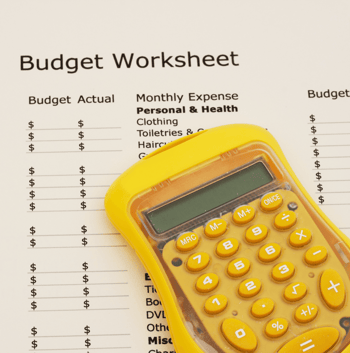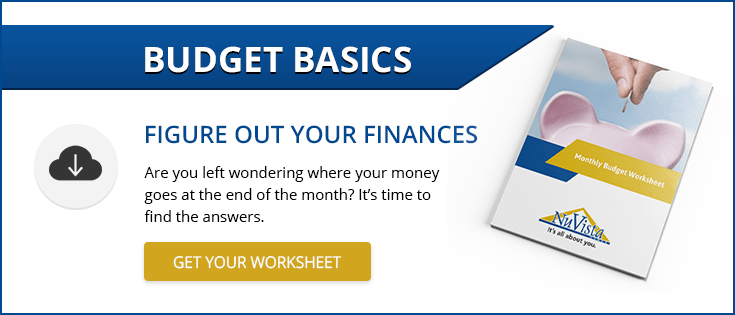 The dreaded b-word has caused many headaches for people looking over their finances.
The dreaded b-word has caused many headaches for people looking over their finances.
Yes, we're talking about budgeting!
But what if making and maintaining a budget is easier than you think? If you're ready to take control of your wallet, here are ten secrets to successful budgeting.
 1. Track Your Expenses
1. Track Your Expenses
The first step of budgeting is figuring out the wheres, whens, and hows of your expenses.
You might be surprised to realize how much of your income is going towards your daily Starbucks order!
The good news is, it's easy to track your expenses through bank and credit card statements, so it doesn't take much effort to build a profile of your spending habits. Once you know where your money is going, it'll be much simpler to control it or find creative ways to cut costs at home. Our monthly budget worksheet can help you visualize all of your expenses in one convenient place.
2. Lay Out Your Goals
Whether you're figuring out your new home finances or just hoping to have more pocket money in your day-to-day life, there's probably a reason you're thinking about your budget.
Knowing these goals can help you with your spending and earning calculations. For example, if you want to pay off your car in the next year, you can take your total remaining payment amount and divide it by 12.
Voila! That's the amount you need to save each month.
 3. Stop Using Plastic
3. Stop Using Plastic
Studies have shown that consumers spend less money when they're dealing with cash rather than credit cards. There's something about actually, tangibly parting with a stack of bills that makes the purchase seem more real than just swiping some plastic through a card reader.
To make this psychological phenomenon work for you, start carrying cash for your everyday purchases instead of a credit card. You'll be more careful with your funds while also avoiding credit card debt.
4. Consult Your Calendar
Maybe you have an anniversary to celebrate or a baby shower to organize. Whether it's a wedding, birthday, fundraiser, or vacation, it's important to plan for special occasions in advance.
For example, if you already know your child is graduating in May, you can save a little extra in March and April so you won't go over-budget when the time comes. You can avoid "splurging" if you curb your spending in the days or weeks preceding the event.
5. Pay Your Bills Automatically
Many banks offer auto-pay options that will automatically deduct your bills from your checking account when they're due. This will stop you from dipping into your rent money to pay for luxuries and indulgences, and it will also ensure all of your bills get paid on time and without penalties.
You won't rack up late fees that stretch your budget even further, and your credit score will increase, too!
6. Allocate Your Money
Let's say you have $500 a month in disposable income after all of your bills have been paid. If you have trouble staying under this amount, it might help to break it into chunks and dispense it according to a specific schedule.
For example, $500 a month translates to $125 a week or $16 a day. If you find it difficult to stay under your monthly budget, start restricting yourself to your weekly or daily one. And remember to carry this amount in cash rather than trying to calculate it through debit or credit.
7. Sleep On It
Impulse shoppers, this tip is for you.
Instead of indulging your whims as soon as you catch sight of a shiny new product or service, wait at least one REM cycle before you allow yourself to buy it. You might just find that your "craving" disappears with a good night's sleep and a little perspective.
If you still want it after you've had some time and distance to consider your decision, go ahead and make room for it in your budget. In this case, you may consider getting rid of something old whenever you buy something new. This could even be a way to earn a little extra cash, by organizing a successful garage sale.
8. Plan Your Meals
Do you have a bad habit of overspending at the grocery store? Do you find yourself throwing away a lot of fresh ingredients because they don't get used before they wilt?
Not only is this wasteful, but it's also cutting into your budget in an unnecessary way. Start planning your meals in advance so you'll only buy the meats, veggies, and spices you'll actually use throughout the week.
9. Get the Whole Family Involved
It can be hard to stick to a budget when your kids are giving you puppy-dog eyes about something they want.
You'll have much more success if you involve them in the planning and calculating of monthly expenses!
You don't have to get into the nitty-gritty of understanding your mortgage payments; just turn things like grocery shopping into a game. Your kids will have fun running around the store and comparing prices, and they might even learn something about managing money, too.
10. Find Deals and Discounts
The easiest way to save money is to not spend it in the first place. If you're serious about reducing your monthly expenses, look for cost-cutting opportunities in everything that you do. Use coupons at the grocery store; raise your deductible for lower car insurance premiums; only shop online if there's free shipping.
A little frugality today can save your wallet tomorrow.
These are just a few tips for making a budget and sticking to it. It might be difficult in the beginning, but once you build better habits and really get into the groove of things, you'll find that saving money can be just as rewarding as spending it!





